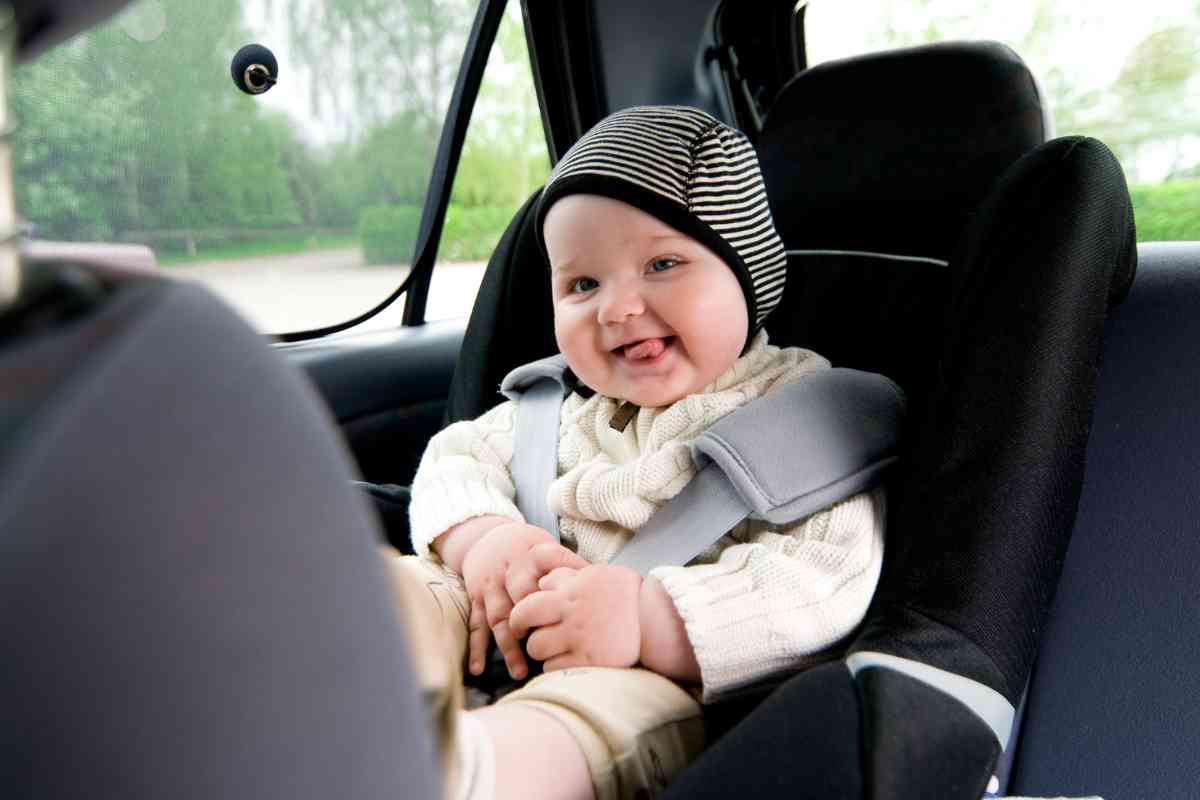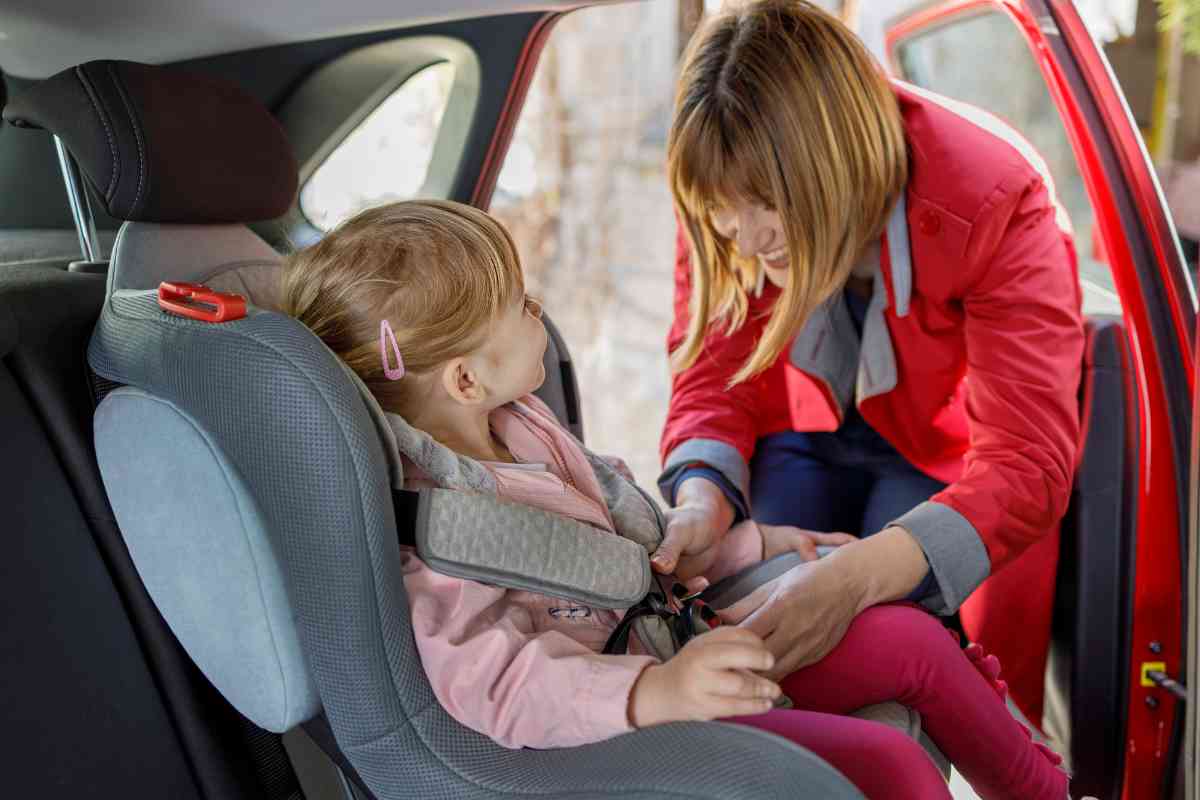As disclosed by the Alabama Department of Public Health, while navigating the roads of Alabama, individuals face a significant 54.1% likelihood of encountering an automobile mishap throughout their lifetime.
However, when accompanied by a child passenger, mitigating the risk of severe injuries becomes paramount, with a rigorously crash-tested car seat emerging as the most effective approach.
In strict adherence to Alabama’s car seat laws, all children below 15 must be securely restrained in an appropriate car seat or by utilizing a seat belt.
The burden of ensuring the child’s proper restraint rests solely on the shoulders of the person accountable for their transportation.
Any violation of this legal mandate incurs a penalty of $25. The article covers extensively various aspects of Alabama car seat laws.
Alabama Car Seat Laws on Forward-Facing Seats
Under the Alabama forward-facing car seat law, children between the ages of 1 and 5 years or weighing a minimum of 40 pounds are mandated to ride in a forward-facing seat.
Alabama’s stipulated age range for forward-facing car seats spans 1 to 5 years.
However, the Alabama Department of Public Health advises that children remain secured in a forward-facing seat with a harness until they surpass the seat’s prescribed height and weight limits, as the manufacturer designated.
Noncompliance with Alabama’s forward-facing child seat law carries a penalty of $25, placing the responsibility on the person responsible for transporting the child.
The trial judge retains the authority to dismiss the charges if evidence is presented to substantiate the acquisition of a forward-facing seat. Nevertheless, the offender’s driving record will incur demerit points.
Alabama Car Seat Laws on Rear-Facing Seats
As per the Alabama statute concerning rear-facing car seats, infants must be firmly placed in a rear-facing seat until they reach a minimum age of one or a weight of 20 pounds.
Compliance necessitates the utilization of a seat that adheres to federal safety standards and its installation in strict accordance with the manufacturer’s instructions.
Violating the rear-facing car seat law in Alabama incurs a penalty of $25. However, the trial judge can dismiss the charges upon demonstrating possession of an appropriate car seat.
The Alabama Department of Public Safety will allocate demerit points to the offender’s records.
Although the rear-facing car seat age requirement in Alabama is established at one year, the American Academy of Pediatrics advises prolonging the use of rear-facing seats as much as possible per the seat’s upper limits based on height and weight guidelines.
Alabama Car Seat Laws on Booster Seats
The Alabama booster seat law mandates that children remain in booster seats until they reach six. The type of booster seat, either high-back or backless, may vary depending on the characteristics of the vehicle seat.
While the booster seat age requirement in Alabama concludes at six years, the National Highway Traffic Safety Administration advises transitioning a child to a booster seat only when they have exceeded the height and weight limitations of their forward-facing seat.
Children must continue using a booster seat until they have reached a size that allows the seat belt to fit them appropriately, typically when they attain a height of 4’9″.
Noncompliance with Alabama’s booster seat requirements results in a fine of $25, and the individual responsible for transporting the child bears the responsibility.
Alabama Child Seat Belt Law
Under the child seat belt law in Alabama, it is mandated that all children within the age range of 6 to 15 years employ an adult safety belt, irrespective of their seating position, be it the front or backseat.
Proper seat belt usage entails the lap belt resting across the upper thighs and the shoulder belt fitting across the chest.
Failure to comply with Alabama’s children’s seat belt law constitutes a violation and incurs a fine of $25.
Exceptions to the seat belt rules in Alabama encompass individuals unable to wear a seat belt due to medical reasons, provided they possess a written statement from a licensed physician. These rules also do not apply when traveling in a vehicle manufactured before 1965.
Alabama Child Front Seat Law
While Alabama lacks a specific law concerning child front seat usage, the AAP recommends that children occupy the backseat until they reach 13 years of age, as it is considered the safest location for children. The Alabama Department of Public Health also endorses this perspective.
If a vehicle lacks a rear seat or circumstances prevent the child from occupying the backseat, they may occupy the front seat.
It is of utmost importance to guarantee the meticulous restraint of the child within a car seat that aligns with their height and weight, in strict accordance with the car seat regulations enforced in Alabama. Deactivating the front seat airbag is essential.
Given the absence of a standard front-seat age requirement in Alabama, adhering to the AAP and the Department of Public Health recommendations is advisable.
Alabama Taxi Child Seat Law
In Alabama, taxis are exempt from the child seat requirements stipulated by law.
Under Alabama state law, children six years and younger must be secured in an appropriate child restraint when riding in a vehicle. However, it is not the responsibility of the taxi driver to provide a child seat.
Hence, parents and caregivers should arrange an appropriate car seat before traveling with a child in a taxi. Failure to comply may result in a $25 fine.
Referring to the car seat manual and seeking assistance from the cab driver for properly installing the seat are recommended.
Alabama Ridesharing Child Seat Law
The ridesharing child seat law in Alabama needs to be clarified.
Car seat laws in Alabama dictate that all children up to age 6 must be restrained in a car seat appropriate for their size.
However, the law remains silent on whether it encompasses ridesharing services such as Uber and Lyft, and it does not provide specific guidance on the party responsible for supplying a child seat in such circumstances.
The parents/caregivers or the driver can provide a car seat in such instances. Infants require a rear-facing car seat, while toddlers and young children require a forward-facing seat with a harness or booster. The installation of the car seat should adhere to the manufacturer’s instructions.
Alabama Child Seat Replacement Law
Alabama does not have a specific law about the replacement of child seats. However, replacing the child safety seat is vital to moderate the severity of accidents involving your vehicle in Alabama.
A car seat or booster seat involved in a crash may possess imperfections that are not visible to the naked eye. Hence, replacing them following a moderate or severe collision is crucial.
Low-impact accidents do not mandate automatic replacement of the car seat. A low-impact crash satisfies all five conditions outlined by the NHTSA.
Moreover, child seats should be substituted if they are subject to a recall notice, exceed a lifespan of 6 years, or are deemed inadequate due to the child outgrowing them.
Leaving Child in the Car in Alabama
As per the legal provisions in Alabama regarding unattended children in vehicles, it is explicitly prohibited for licensed daycare centers and other childcare facilities to leave children under the age of 7 alone inside a vehicle.
Individuals associated with such facilities and responsible for leaving a child unattended in a car in Alabama are subject to a minimum fine of $2000.
This provision, the Amiyah White Act, exclusively applies to licensed childcare service providers. However, leaving a child unsupervised in a vehicle poses significant dangers.
The most prevalent hazard is heatstroke, as temperatures inside a vehicle can rapidly escalate.
Due to children’s bodies heating up faster than adults, they are particularly susceptible to heatstroke.
Other risks include accidental vehicle movement, entanglement in seat belts or power windows, and other in-car accidents.
How to Choose a Child Car Seat in Alabama
When selecting a car seat in Alabama, ensure it conforms to the state’s child seat laws. Guidelines provided by the Alabama Department of Public Health can assist in this process.
Rear-facing seats are recommended for infants under the age of 2. And forward-facing car seats should be used for children under five years old.
Once a child outgrows their forward-facing seat, they should transition to a belt-positioning booster seat. The ideal booster seat in Alabama allows the seat belt to cross the child’s shoulders and lap securely.
Car Seat Installation Assistance in Alabama
Installing child passenger safety seats in Alabama can be a complex undertaking. It is crucial to thoroughly read the manuals for both the car seat and the vehicle to avoid improper installation, which can endanger your child.
Numerous stations across Alabama house certified Child Passenger Safety technicians to facilitate safe installation.
These experts can inspect your seats, provide guidance on proper installation, and furnish additional information on car seat safety. Some notable fitting stations include:
- Dothan Fire Department
- Huntsville Hospital for Women and Children
- Safe Kids Alabama
For a comprehensive list of fitting stations, consult the Alabama Department of Public Health.
Alabama Car Seat Safety Resources

Below are the places you can find resources and materials concerning Alabama car seat safety.
1. Alabama Department of Public Health
The official website of the department contains essential information regarding the law and best practices for car seats and booster seats.
2. Children’s of Alabama
As a prominent children’s hospital, it has provided medical care to children since 1911.
Their resources encompass comprehensive information on child passenger safety, including best practices for various car seat types, safety tips for parents, and transportation guidelines for children with special needs.
3. Safe Kids Alabama
This Alabama coalition conducts car seat checks and safety workshops and offers valuable resources to assist families in preventing childhood injuries.
Related:

